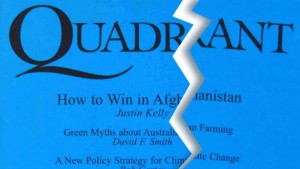Home » Commentary » Opinion » Free debate more practised on the Right
· Ideas@TheCentre
 There is a debate about public funding of literary journals, and other forms of middle-class cultural welfare such as the opera and the symphony.
There is a debate about public funding of literary journals, and other forms of middle-class cultural welfare such as the opera and the symphony.
But that debate is separate to whether the taxpayer’s money that does subsidise the arts and letters is distributed without political bias.
I’ve been vocal about the Australia Council’s decision to de-fund Quadrant magazine.
The Left loves to pay lip service to the ideals of diversity and respect for free inquiry. But I have found that ideals are more often genuinely practised on the Right.
Ten years ago, Quadrant published an article by me on the White Australia Policy, which was critical of aspects of the book that Keith Windschuttle had written on the subject, and which prompted a typically combative response from him in a subsequent edition.
In the decade since, Quadrant, under Windschuttle’s editorship, has published a number of articles by me on a range of topics.
I can’t help wondering if someone who had criticised the work of Robert Manne, say, would get as good a run in The Monthly?
I think the reason the Right tolerates different answers to the same questions without recriminations, and doesn’t impose a political bar on those who differ, is that it is more interested in doing good, rather than seeming good by supporting the ‘right’ causes.
A good example of this may be my critical review in the June edition of Quadrant of Stan Grant’s new book, Talking to My Country — a book universally acclaimed by the Left.
Grant’s book argues that entrenched Indigenous disadvantage continues to persist in Australia due to the failure to address the legacy of racism dating back to the original sins of colonisation.
The gist of my response is that Grant has got his history the wrong way round. The major cause of the worst Indigenous disadvantage has been the impact of the policies of Aboriginal Self-Determination, which were implemented in the 1970s to address the historic wrongs of dispossession.
If we take heed of Grant’s book, we will believe — as many on the Left argue — that the answers to overcoming Indigenous disadvantage lie in continuing to reckon with history by undertaking symbolic Reconciliation via the Recognition and Treaty movements.
To the contrary, the real answers lie in practical Reconciliation — as has been the central message of the revisionist literature that has reshaped the Indigenous debate over the last 20 years, much of which has been published in Quadrant.
Free debate more practised on the Right